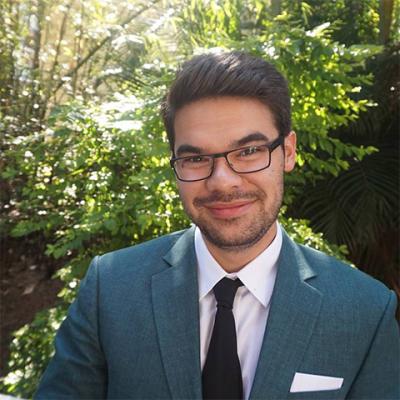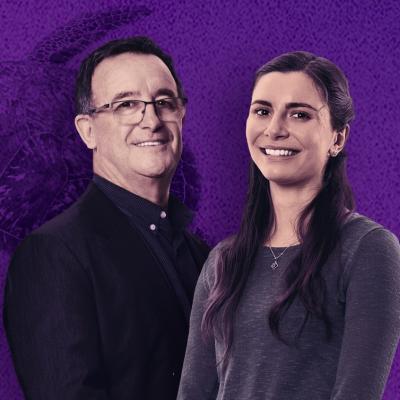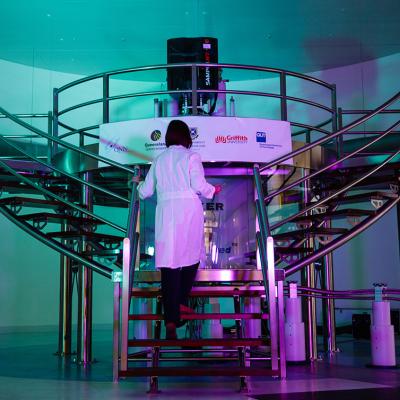The jobs you can get with a science degree are so varied that you may feel a little overwhelmed at first. But embracing this wealth of opportunities will help you find the career options in science incredibly exciting.
Whether you want to develop a new beverage rich in vitamins or transform complex data into actionable insights for some of the world’s biggest tech innovators, we’ve got you covered. Even if you’re unsure which area of science you’re most interested in, we hope this snapshot of science degree jobs will help you find a little direction – or simply get you excited about trying them all out.
So, if you’re wondering what to do after a Bachelor of Science, read on to discover what your future career could look like.
As we mentioned previously, there are a huge range of careers you can pursue with a Bachelor of Science, depending on your major. The following are just a sample. Explore UQ’s Bachelor of Science majors to discover what other career paths are open to you with this degree.
Food chemist
Put simply, a food chemist uses their scientific knowledge to closely examine the chemical makeup of food products. Food chemists typically work in laboratories or on-site at farms and food processing plants. They play a vital role in the development and improvement of food products and beverages in a world that’s facing ever-increasing food security issues.
What do food chemists do?
The main role of a food chemist is to improve the quality, safety, and reliability of food products for commercial and institutional uses. However, analysing the chemistry behind food to develop new food and beverage products can also be part of the job.
As a food chemist, on a day-to-day basis you can expect to:
- test products to learn more about their chemical makeup and to provide accurate nutrition labelling
- develop ways to preserve natural foods while maintaining their flavour, safety, and health benefits
- use chemicals to create new flavours for food and beverage products
- conduct quality control to ensure products meet the standards of governing health and regulatory bodies as well as the standards of the organisation producing the food or beverage products.
Food chemist skills
To excel in the area of food chemistry, you’ll need:
- strong observation skills
- the ability to analyse complex data
- a proficiency with data analysis software
- creative and critical thinking capabilities
- a strong understanding of, and passion for, the role chemistry plays in food science.
Interested in kickstarting a career in food chemistry? UQ’s Bachelor of Science, majoring in Food Technology or Food Science and Nutrition, can help you build skills in this area.
Find out what it’s like to study science at UQ
At the time of filming, Professor Susan Rowland was a UQ science lecturer and Jasper was a Bachelor of Advanced Science student, who has since progressed to study a PhD with Queensland Brain Institute.
Bioinformatician
Bioinformaticians use technological resources and tools to answer biological questions in medicine, life sciences and other health-related fields. They develop methods and software tools for understanding large and complex biological data sets and typically work in industrial, laboratory, or classroom settings.
Bioinformatics is multidisciplinary, as professionals in this field can bridge biological sciences, informatics, mathematics, computer science, and more. To become a bioinformatician, you typically will need experience in the areas of biology, biochemistry, genetics, ecology and biomedical science. Postgraduate qualifications, such as a Graduate Certificate, Graduate Diploma or Master of Bioinformatics will give you a competitive edge when gaining employment in this industry.
What does a bioinformatician do?
In this role, you can expect to:
- study, analyse, and dissect large and complex amounts of data at the molecular level, e.g. DNA, RNA, and protein
- work alongside scientists in the fields of biology, microbiology, agriculture, or computer science to develop biological databases for the purpose of understanding and deciphering the data you’ve collected
- develop algorithms and software tools, and curate databases
- consult with laboratory scientists in the health or pharmaceutical industries to plan, design and tailor bioinformatics efforts.
Bioinformatician skills
To become a bioinformatician, you’ll need:
- strong problem-solving skills
- familiarity with computer programming
- high attention to detail
- clear and concise communication skills
- persistence and patience
- an aptitude for collaboration with a wide range of stakeholders.
Discover how you can build your skills in bioinformatics through UQ’s Bachelor of Science – Bioinformatics major.
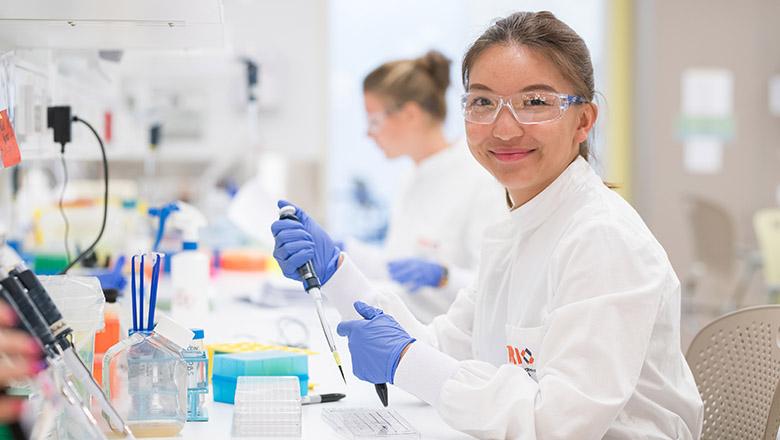
Data scientist
Data science is quickly evolving as one of the most in-demand career paths for skilled professionals. In a nutshell, a data scientist knows how to extract meaning from and interpret complex data with the help of specific tools and methods from statistics and computer science.
With a full understanding of the data science life cycle, data scientists transform massive amounts of data into actionable insights that can have a profound impact for organisations, their customers, stakeholders, and the public in general.
Do you need a PhD to be a data scientist?
No. But postgraduate studies in data science, such as a Master of Data Science, can greatly increase your likelihood of landing a job, and may even boost your salary, too – see the table below as a guide.
UQ science and mathematics graduates
| Study level | Median recent UQ science and mathematics graduate income |
|---|---|
| Undergraduate | $68,400 |
| Postgraduate | $91,300 |
An entry-level data scientist salary in Australia is around $78K. Depending on the company hiring, you may obtain a higher starting salary with a postgraduate qualification. In saying this, many data scientists start out as data analysts and work their way up the ladder to a promotion and pay rise.
What does a data scientist do?
In this role, you can expect to:
- design data modelling processes to create algorithms and predictive models, and perform custom analyses to mine stores of big data
- analyse data to identify potential trends or patterns and interpret that data to discover solutions or opportunities
- collect large sets of data from different sources and clean and validate that data to ensure its accuracy, completeness, uniformity, and relevance
- communicate your findings to stakeholders.
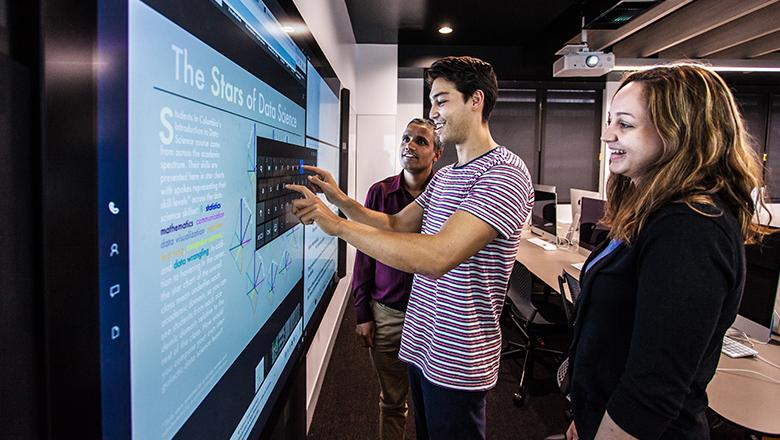
Important skills for data scientists
To become a data scientist, you’ll need:
- a keen interest in, and knowledge of, programming and machine learning techniques
- strong skills in statistical analysis and mathematics
- structured thinking skills
- data visualisation and reporting skills
- competent and clear communication skills for reporting your findings to stakeholders.
Keen to start developing your data science skills? UQ’s Bachelor of Science – Computer Science major can get you there.
Meet Chris, an environmental officer at Brisbane City Council
Chris graduated from UQ’s Bachelor of Science, majoring in ecology and geographical sciences in 2016. He then went on to complete a Master of Environmental Management in 2018.
Chris now works as an environmental officer at Brisbane City Council, where he assesses projects such as park redevelopments through to large scale road infrastructure upgrades against federal, state and local legislation.
“This ensures thorough environmental due diligence of each project and that all necessary permits and approvals have been obtained to lawfully conduct work that also meets high public standards,” says Chris.
“During construction phases of projects, I also assess compliance by conducting site audits to ensure the on-ground works are occurring in accordance with all relevant permits and plans.”
Before this, Chris worked as an ecologist with sustainability consultancy, Environmental Resources Management (ERM), where he had the chance to conduct extensive fieldwork.
“At ERM, I worked broadly across Queensland as an ecologist on the coast and out west on renewable energy projects,” Chris says.
“This would see me take part in hands-on ecological fauna and flora surveys assessing various vegetation types, spotlighting for nocturnal species, and conducting trapping surveys to name a few assessments. This was a great way to see Australian wildlife up close and personal!”
Chris explains that having a mix of office-based and fieldwork skills has been beneficial to his career.
"It gives you an appreciation for the crews on the ground and the environmental values you're seeking," says Chris.
“At the same time, having office focused skills allows you to interpret and apply those findings well. The combination of both gives you an edge and keeps more career doors open.”
The broad range of subjects available in UQ’s Bachelor of Science is what Chris believes helped to shape his career.
“The program is very flexible and it allowed me to narrow my interests as my studies progressed,” he says.
“From ecology courses to environmental law and even plant identification, you can tailor the degree to suit your career path.”
Marine biologist
Marine biologists study life in the world’s oceans and play a critical role in conserving biodiversity and looking after the health of marine environments. They work at all biological scales, studying molecules and cells in microscopic plankton, to threatened whale species in the open ocean and entire coral reef ecosystems.
Marine biologist jobs range from those in federal government agencies, to public and private research laboratories, universities, aquariums and museums. All sectors reliant on healthy coasts or ocean resources benefit from the knowledge, research and work conducted by marine biologists.
Eager to study marine biology? Discover UQ’s Bachelor of Science, majoring in Marine Biology or Coastal and Ocean Science.
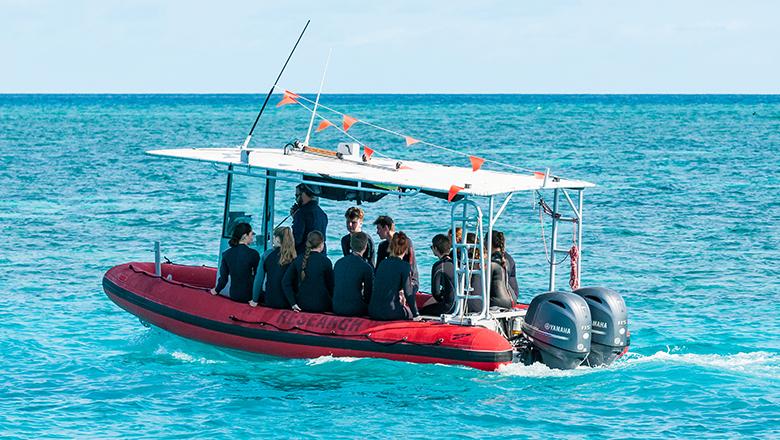
What does a marine biologist do?
In this role, you can expect to:
- closely observe and gain a better understanding of marine life and its role in marine environments
- assess and analyse the biodiversity and health of marine environments
- apply state-of-the-art approaches and tools to assess marine biological and ecological systems, from genome-level analyses to complex ecosystem modelling
- partner with communities, governments, Traditional Owners, industry, and other stakeholders to deliver solutions that drive positive social and environmental change.
Marine biologist skills
The skills needed to be a marine biologist include:
- problem-solving
- confident communication
- stakeholder management
- teamwork
- observation
- computer literacy
- creative and critical thinking.
Want to know more about the types of careers you can pursue with a university degree in science?



